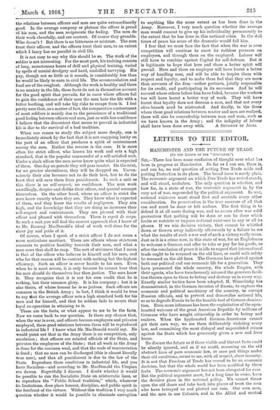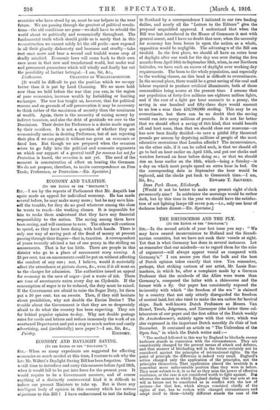LETTERS TO THE EDITOR.
MANCHESTER AND THE FUTURE OF TRADE.
[TO TIM EDITOR Or ma " SPECTIT011."] Sra,—There has been some confusion of thought over what has been in progress at Manchester. So far as I can see, there is, and can be, no real question of setting Free Trade aside and putting Protection in its place. The broad issue is surely plain. The economic argument on which Free Trade has rested stands, and will stand, unshaken. The only question is whether, and how far, in a state of war, the economic argument is, by the very act of war, superseded by the political argument. In war, national existence must stand first and override every other consideration. Its preservation is the true measure of all that can and must be done or left undone. The first thing is to defend it at all costs during war, and to secure after war solid guarantees that nothing will be done or can be done which limits or restricts or impairs national existence in any or all its phases. If wo win decisive victory, that cannot be whittled down or thrown away indirectly afterwards by a failure to see what the results of such a war and of such a victory really mean. Just as it is a crime now, in this state of war, for an Englishman to welcome a German and offer to take or pay for his goods, so after the conclusion of peace it is idle to expect that international trade ought to be resumed on the old lines, or could with safety be resumed on the old lines. The Germans have plotted against both our political and our economic life for a generation. They have permeated the whole country, the whole Empire, with their agents, who have treacherously misused the generous facili- ties thrown open to them to betray and destroy us in every way. Exactly similar tactics have been adopted, M. Wessolitsky has demonstrated, in the German invasion of Russia, to capture the economic and political machinery of the country, to corrupt Russian officials, and to pervert and demoralize national life, so as to degrade Russia to be the humble tool of German domina- tion. Even more infamous has been the exploitation of the open- hearted welcome of the great American Republic by millions of Germans who have sought citizenship in order to betray and enslave. When the hyphenated Gorman-Americans cannot got their own way, we see them deliberately violating every law, and committing the most disloyal and unparalleled crimea against the State which has generously given a now and freer home.
To discuss the future as if these visible and blatant facts could bo silently ignored, and as if we could, reasoning on the old abstract lines of pure economic law, at once put things under their old conditions, seems to me, with all respect, sheer insanity. It is not that Freedom of Trade has ceased to be an economio doctrine, but that the whole world has been modified by these facts. The economic argument has not been abrogated for ever. But the political argument must, for a long time to come, have the decisive place in the national policy. We cannot throw open the old doors and take back into places of trust the men who have betrayed us and plotted our ruin. Our own mon, and the men in our Colonies, and in the Allied and neutral countries who have stood by us, must be our helpers in the near future. We are passing through the greatest of political revolu- tions—the old conditions are gone—we shall have to rebuild the world about us politically and economically throughout. The fundamental truth which should guide us is surely that in this reconstruction we cannot safely let the old perils—now exposed in all their ghastly dishonesty and baseness and cruelty—take root once more and bear a second and tenfold worse crop of deadly mischief. Economic laws will come back to their own once more in that new and transformed world, but under real and permanent guarantees which will wholly and finally bar out the possibility of further betrayal.—I am, Sir, &c.,
Eastbourne. ClIANN.MG OF WELLDIGBOROIJOR.
[It would be difficult to put the position which we occupy better than it is put by Lord Charming. We no more hold now than we held before the war that you can, in the region of pure economics, increase wealth by forbidding or limiting exchanges. The war has taught us, however, that for political reasons and on grounds of self-preservation it may be necessary to think rather of the maximum of security than the maximum of wealth. Again, there is the necessity of raising money by indirect taxation, and also the debt of gratitude we owe to the Dominions. Their desire for Preference is a desire made urgent by their sacrifices. It is not a question of whether they are economically =visa in desiring Preference, but of not rejecting their plea if we can grant it without too great an economic or &cal loss. But though wo are prepared when the occasion arises to go fully into the political and economic arguments on which our support of a general tariff for revenue but not for Protection is based, the occasion is not yet. The need of the moment is concentration of effort on boating the Germans. We do not propose, therefore, to invite correspondence on Free Trade, Preference, or Protection.—En. Spectator.]



































 Previous page
Previous page